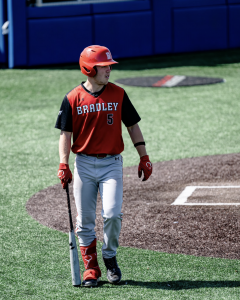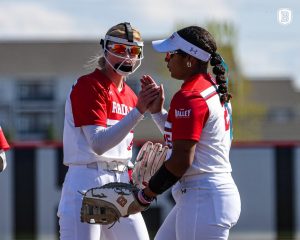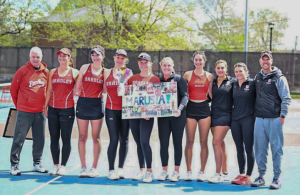Originally published in the September 10, 2010 issue
Even though the jerseys that hang above the hardwood at Carver Arena may not mean much to the average Bradley student, they symbolize the best in the history of Bradley basketball.
One name is conspicuous in its absence, but because of that the name is rarely ever spoken on campus.
Gene “Squeaky” Melchiorre.
The Joliet native was born to God-fearing parents in 1928. Standing only at 5-feet-8 inches, the man was unstoppable. His “chubby” quickness made it almost impossible to stop him from reaching the basket. After being honorably discharged from the army at the end of WWII, he and his army buddy Bill Mann enrolled at Bradley.
It quickly became apparent his skills were unmatched. His freshman year, with the help of Bradley great Paul Unruh, Bradley went 28-3. In his sophomore year, he scorched the opposition for 71 points in a single NIT game, a record that still stands today.
Melchiorre led the Braves to the NIT and NCAA three years in a row with appearances in both tournament finals his junior year.
Bradley lost both to CCNY. Even after two steals and two buckets in 14 seconds to cut the lead down to one with 40 seconds to go in the National Title game, the Braves fell just short. After another Melchiorre steal, he drove to the basket, got fouled and fell to the ground.
No call.
One blown call away from a National Title his junior year, Gene’s senior year was not as successful. The NCAA took only conference winners, and Bradley did not win the Missouri Valley Conference, despite a 32-6 record. They turned down an invite to the NIT because CCNY and multiple other New York universities who regularly played in the NIT had been found out in a large, nation-wide point shaving scandal.
Bradley didn’t want to dirty its image.
Though his collegiate career ended on a sour note, Melchiorre was drafted with the No.1 pick in the NBA Draft by the Baltimore Bullets. He soon married his Bradley sweetheart and started a family.
How can a man with such accomplishments on the hardwood not have a jersey looking down on Carver Arena? How come the only recognition of Melchiorre on campus is a small picture in the new arena?
Like many of us, Melchiorre made a regrettable decision in his youth. Unlike most of us, it would not blow up as part of a nationwide scandal; point shaving.
The GI Bill of Rights only paid for tuition and books. The university only provided him one meal a day during the basketball season. Melchiorre had to pay for room and board himself.
Near the end of his sophomore year, after losing a semi-final NIT game in N.Y., Melchiorre and two other teammates were approached by fixers and were told they could be paid if they won a game against Bowling Green within the spread.
Melchiorre’s junior year, the point shaving increased. Going over the spread against TCU 85-49 earned you $100. Beating Washington 67-59 fetched $600.
Anytime they were offered money to lose, they denied. They turned down $10,000 apiece to throw the national title game against CCNY.
His senior year, against the same CCNY team, they won under the spread and were paid $2,000. Not bad getting paid to beat the team that broke your heart.
Then the ax fell. The detectives who had taken down all the N.Y. teams found a call from N.Y. to Peoria. The only piece of information they had was the point shaving in that first game against Bowling Green. That’s all they had, but the detectives bluffed and pressured Melchiorre into telling more.
They admitted to pocketing money. Two teammates said the money came directly from Melchiorre. Peoria papers falsely reported Melchiorre pocketed more money than reported. Soon enough, Squeaky was an outcast in Peoria.
Shunned from Peoria, Squeaky and his wife moved up to Hyde Park. Quickly, he became a successful insurance salesman and started many successful small businesses.
“I never really got to know God until I got into all the trouble,” Melchiorre said. “After awhile, I became convinced that my involvement in the scandals was the best thing that ever happened to me. It made me a better person.”
He took what he learned at BU and made himself a very successful man in both business and life. The errors he committed on the hardwood helped him become a better man off the court.
If he doesn’t deserve to have his number retired, then I don’t know who does. Like our motto, “Once a Brave, always a Brave.”




